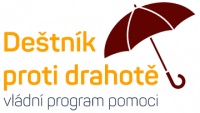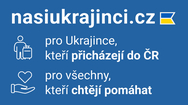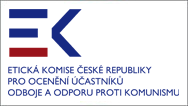Rada vlády pro záležitosti romské menšiny
G O V E R N M E N T O F T H E C Z E C H R E P U B L I C
A n n e x IV.
to Government Resolution
of 28 January 2004 No.100
S t a t u t e
of the Council of the Government of the Czech Republic for Roma Community Affairs
Article 1
Introductory provisions
(1) The Council of the Government of the Czech Republic for Roma Community Affairs (hereinafter referred to as the „Council“), is a permanent, advisory, initiative body of the Government for Roma community affairs.
(2) The Council was established through the Government Resolution of 17 September 1997 No. 581, on establishment of the Interdepartmental Commission for Roma Community Affairs.
Article 2
Competence of the Council
(1) The aim of the Council is to assist in the integration of the Roma community into society.
(2) The Council in particular:
a) prepares and considers groundwork documents for the Government decision-making and comments on proposals of other bodies relating to the Roma communities,
b) evaluates fulfillment of the adopted Government Resolutions relating to the Roma communities,
c) submits to the Government or to its competent members and to heads of central state administration bodies, who are not members of the Government, proposals relating to the Roma communities
d) proposes the distribution of funds allocated to supplementary programs aimed at supporting of the integration of the Roma communities and through its members appointed to selection commissions takes part in the distribution of these funds,
e) collects, analyzes and evaluates information on the development of Roma communities and at least once in a calendar year prepares a summary information on Roma communities,
f) actively cooperates with non-governmental non-profit organizations and international organizations which contribute by their activities to the integration of Roma communities,
g) cooperates with regional and local self-governing bodies in the integration of Roma communities,
h) informs the public about issues relating to the Roma communities and promotes availability of information and education in the Roma communities,
i) acts as a consultative body in matters of methodological guidance for regional coordinators, Roma advisors and assistants to state administration bodies.
(3) The Council and its members, as well as specialized committees and working groups of the Council and its members may within the scope of competencies of the Council require information and positions from central state administration bodies, therefore, even from those not represented in the Council, from other state administration bodies and from organizations and institutions subordinated to state administration bodies. If the need arises, they may contact with their requests for information also self-governing bodies. This is without prejudice to provisions of special legal regulations.[1].
(4) The Council in collaboration with the competent central state administration bodies takes part in the development of departmental Concepts pertaining to the Roma integration.
Article 3
Composition of the Council
(1) The Council has 28 members, comprising the Chairman, two Vice-Chairmen and other members.
(2) The Chairman of the Council is appointed and recalled by the Government; he is a member of the Government.
(3) The first Deputy Chairman of the Council is the Government Representative for Human Rights. The second Deputy Chairman is one of 14 representatives of the Roma community (Para 5 letter b/), who is appointed and recalled by the Chairman of the Council.
(4) Members of the Council are appointed and recalled by the Chairman of the Council after consultation with the Head of the Office of the Council and regional Roma coordinators. If the membership of the Council arises from the function, appointment is not required.
(5) Additional members of the Council are:
a) Deputy Minister of Labour and Social Affairs, Managing Director of the Employment Services Administration, Deputy Ministers of Finance, Culture, Regional Development, Defence, Industry and Trade, Justice, Education, Youth and Physical Education, Interior, Foreign Affairs, Health,
b) representatives of the Roma community, one per each region.
(6) The term of office of members of the Council is two years. The number of repeated appointments is not limited.
(7) Membership of the Council ends:
a) in the case of the Chairman with the end of the performance of the function of a member of the Government,
b) in the case of state administration representatives with the recalling from their function or termination of their employment or of their service,
c) with resignation of a member of the Council prior to the end of the term of office,
d) with expiration of the term of office of a member of the Council,
e) with death of a member of the Council.
(8) Substitutability resolves the attendance of a permanent representative of the Council. A permanent representative is appointed by the Chairman of the Council on proposal by a member of the Council. The termination of the function of a permanent representative is governed by Art 3.7.
Article 4
The Chairman of the Council
(1) The Chairman of the Council reports on activities of the Council to the Government.
(2) The Chairman of the Council convenes and chairs sessions of the Council. Sessions of the Council are held, according to need, at least once in three months. On proposal by one third of all members of the Council the Chairman of the Council shall convene an extraordinary session in such a manner to be held within three weeks of delivery of the proposal to the Office of the Council.
(3) The Chairman of the Council also in particular:
a) appoints members of the Council,
b) manages activities of the Council,
c) signs positions, recommendations and other materials of the Council,
d) proposes agenda of sessions of the Council,
e) submits materials of the Council to be discussed in Government meetings,
f) on proposal by the Council appoints and recalls the second DeputyChairman of the Council chosen from representatives of the Romany community,
g) on proposal by at least one member of the Council appoints and recalls Chairmen of committees and working groups of the Council,
h) on proposal by the Chairman of the Committee appoints and recalls members of committees,
i) on proposal by at least one member of the Council decides on establishing or dissolution of a working group of the Council and on its composition,
j) decides whether guests and experts will be invited to sessions of the Council,
k) proposes the amount of remuneration to members of the Council and experts, if they are entitled to receive it under Article 10 of this Statute,
l) acts on behalf of the Council in public.
(4) In the case of absence of the Chairman of the Council sessions are chaired by the authorized Deputy Chairman of the Council or another member of the Council.
Article 5
Members of the Council
(1) Members of the Council are obliged to attend sessions of the Council and meetings of committees and working groups into which they are assigned.
(2) Members of the Council have the right to submit proposals to the Council and participate in its meetings. They have the right to be informed about all activities of committees and working groups of the Council and participate in their meetings. In the case of their absence in a session of the Council they have the right to send at least an informal written comment on individual items on the agenda.
(3) If a member of the Council cannot attend a meeting of the Council, he shall apologize for his absence in advance to the Chairman of the Council (through the Office of the Council).
(4) A permanent representative will attend a session of the Council with the right to vote only if the relevant member of the Council is absent. A permanent representative has at the session which he attends in this manner all rights and obligations of a member of the Council and for the purposes of the voting he is deemed to be a member of the Council.
Article 6
Committees of the Council
(1) The Council establishes permanent committees according to need. External collaborators may also be invited to work in a committee.
(2) Only a member of the Council may be the Chairman of the Committee. The activity of the committee is secured by the Secretary of the Committee – an employee of the Office of the Council.
(3) The Council has in particular the committees as follows:
a) Committee for the Policy Concept of the Roma Integration:
- collects, analyzes and prepares groundwork documents for updating of the Policy Concept of the Roma Integration,
- collects, analyzes and evaluates data on the development of Roma communities and submits the evaluated material to the Council for consideration.
b) The Committee for Cooperation with Self-governing Bodies:
- communicates and cooperates with self-governing bodies in the area of integration of Roma communities,
- monitors the fulfillment of integration of Roma communities by regional offices and municipalities with extended competencies,
c) Grant Committee:
- discusses general distribution of funds allocated to the integration of the Roma community into society and prepares for meetings of the Council information groundwork documents relating to the distribution of funds,
- prepares for meetings of the Council evaluation groundwork documents relating to the projects supported from funds allocated to the integration of the Roma community into society.
(4) Committees in particular prepare groundwork documents relating to given issues for meetings of the Council.
(5) Each committee has its statute which is approved by the Council. The statute of the committee must specify, inter alia, whether procedures (meetings) of the committee are regulated by the same rules of procedure as procedures (meetings) of the Council or whether the committee is subject to its own rules of procedure.
Article 7
Working groups
(1) The Chairman of the Council, on proposal by at least one member of the Council, establishes and dissolves working groups, according to need. Working groups do not have their own statute.
(2) The Chairman (Head) of the working group may be only a member of the Council. Also external collaborators may be invited to participate in work in the working group.
(3) Working groups deal with partial issues within the scope of the competence of the Council; in particular prepare groundwork documents for sessions of the Council.
Article 8
External cooperation
(1) The Council may request cooperation from state administration employees who are not members of the Council, or external experts, employees of self-governing bodies and non-governmental organizations (hereinafter referred to as „experts“).
(2) Experts, on invitation from the Chairman of the Council, may attend meetings of the Council, either ad hoc as guests for specific issues or they may participate in work in committees and working groups as permanent collaborators.
(3) The rules regulating the activities of the Council, its committees and working groups shall apply also to permanent collaborators, as appropriate.
Article 9
Office of the Council
(1) The activities of the Council (including the activities of its committees and working groups) are supported by the Office of the Council (hereinafter referred to as the „Office“), which is a structural unit of the Office of the Government of the Czech Republic.
(2) The Office in particular
a) administratively and organizationally supports the activities of the Council,
b) collects groundwork documents and information necessary for activities of the Council,
c) prepares specialized groundwork documents for meetings of the Council subject to instructions of the Chairman of the Council,
d) updates information on the Council and its members published on the web site of the Office of the Government of the Czech Republic,
e) fulfills tasks arising from the organizational rules of the Office of the Government of the Czech Republic
(3) The Head of the Office is responsible for fulfilling the tasks of the Office and manages its activities. The Head of the Office is appointed and recalled by the Head of the Office of the Government of the Czech Republic on proposal by the Chairman of the Council.
(4) The Head of the Office is a Secretary of the Council, attends sessions of the Council in an advisory capacity and manages activities of the Office in accordance with the instructions of the Chairman of the Council.
Article 10
Costs of activities and remuneration
(1) Regular costs of activities of the Council are covered from the budget of the Office of the Government of the Czech Republic. As a rule, meetings of the Council, its committees and working groups take place at the facilities of the Office of the Government of the Czech Republic.
(2) Members of the Council are entitled to the reimbursement of provable travel expenses, in accordance with the valid legal regulations. Business trips are approved by the Head of the Office.
(3) Members of the Council are not entitled to remuneration for the performance of their function, since it is a public function.
(4) However, entitled to remuneration are in accordance with the valid regulations those members of the Council who are neither employees of the state administration bodies, nor employees of the territorial public administration bodies, namely for the work which they provably perform for the Council to order (i.e. as a service), or based on an agreement to perform work outside the employment (agreement to complete a job, agreement to perform work). Such remuneration shall be paid in the amount approved by the Head of the Office of the Government of the Czech Republic. The amount of the remuneration is proposed by the Chairman of the Council.
(5) On proposal by the Chairman of the Council, the reimbursement of travel expenses and the remuneration for the work performed may be granted to experts cooperating with the Council. The same administrative regime applies to these reimbursements and remunerations as for members of the Council.
Article 11
Rules of Procedure of the Council
(1) The procedures of the Council are regulated by the Rules of Procedure of the Council and as a rule also the procedures of its committees and working groups. The Rules of Procedure of the Council, their amendments and supplements, are subject to approval by the Council.
(2) In justified cases committees of the Council may have independent rules of procedure. Such rules of procedure are also subject to approval by the Council.
(3) As a rule, working groups meet informally and decide on a consensual basis. They are regulated to a reasonable extent by the Rules of Procedure of the Council or the rules of procedure of the committee as part of which they are operating. The Chairman of the Council decides, when establishing working groups, which rules of procedure they will be regulated by.
Article 12
Transitory and final provisions
-
This Statute took effect on 28 January 2004 based on approval by the Government through Resolution No. 100 of 28 January 2004
-
By the approval of this Statute the term of office of the existing members of the Council is terminated.
-
Any amendments and supplements to the Statute are subject to approval by the Government.
-
The Statute is available to the public on the web site of the Office of the Government of the Czech Republic and at the Office of the Government of the Czech Republic itself. The version displayed on the web site is always the full wording of the valid Statute.
[1]) For instance Act No. 101/2000 Coll. on the protection of personal data, amending certain Acts, as amended, Act No. 148/1998 Coll, on the protection of classified information, amending certain Acts, as amended.





